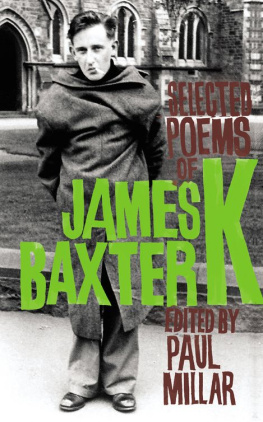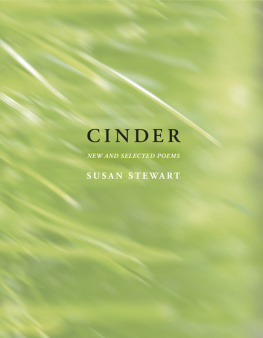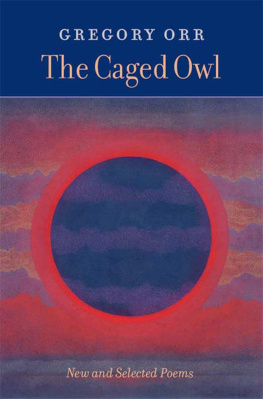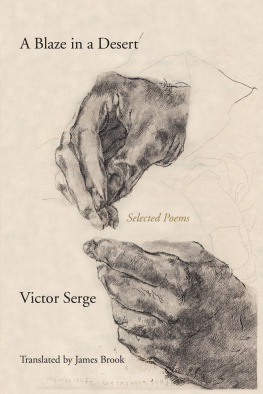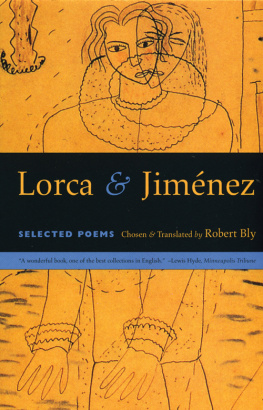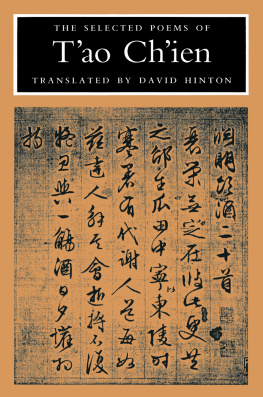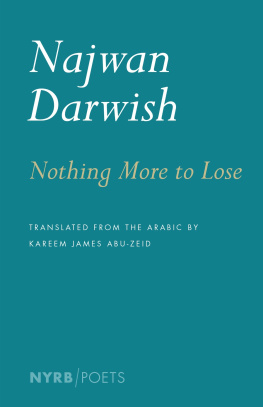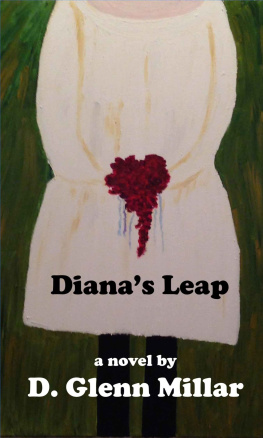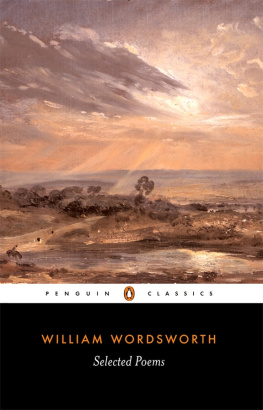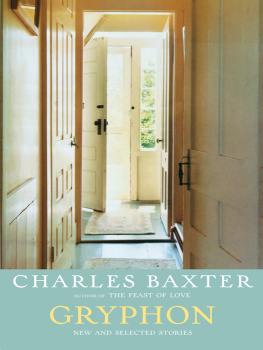Paul Millar (editor) - Selected Poems of James K. Baxter
Here you can read online Paul Millar (editor) - Selected Poems of James K. Baxter full text of the book (entire story) in english for free. Download pdf and epub, get meaning, cover and reviews about this ebook. year: 2011, publisher: Auckland University Press, genre: Non-fiction. Description of the work, (preface) as well as reviews are available. Best literature library LitArk.com created for fans of good reading and offers a wide selection of genres:
Romance novel
Science fiction
Adventure
Detective
Science
History
Home and family
Prose
Art
Politics
Computer
Non-fiction
Religion
Business
Children
Humor
Choose a favorite category and find really read worthwhile books. Enjoy immersion in the world of imagination, feel the emotions of the characters or learn something new for yourself, make an fascinating discovery.
- Book:Selected Poems of James K. Baxter
- Author:
- Publisher:Auckland University Press
- Genre:
- Year:2011
- Rating:3 / 5
- Favourites:Add to favourites
- Your mark:
- 60
- 1
- 2
- 3
- 4
- 5
Selected Poems of James K. Baxter: summary, description and annotation
We offer to read an annotation, description, summary or preface (depends on what the author of the book "Selected Poems of James K. Baxter" wrote himself). If you haven't found the necessary information about the book — write in the comments, we will try to find it.
Selected Poems of James K. Baxter — read online for free the complete book (whole text) full work
Below is the text of the book, divided by pages. System saving the place of the last page read, allows you to conveniently read the book "Selected Poems of James K. Baxter" online for free, without having to search again every time where you left off. Put a bookmark, and you can go to the page where you finished reading at any time.
Font size:
Interval:
Bookmark:
29 September 196831 October 2009 To believe in love
Is difficult. It means that we cannot belong
Any more to ourselves, having suffered a foreign invasion
From heaven.
Stephanie, I confess with terrified
Acquiescence, your springtime banners are inside my gate. from Stephanie by James K. Baxter and Jacquie Baxter (Te Kare Papuni)
17 May 192730 December 2009 Te mate i te wahine he pakaru takere waka.
Kua tukuna te kuru pounamu, ngaro ai i te wao nui a Tne.
In the words of the critic Howard McNaughton: everyone seems to think that his bit of Baxter was the genuine stuff and that anything else is a cheap fraud. This idea of Baxter as a literary relic sunk deep in the New Zealand collective unconscious to disturb the nations slumbers may help explain the fact that despite being one of the most prolific and precocious English-language poets of the twentieth century he is almost unknown outside his country. One might reasonably suppose that a poet who was born and died in his own country, who left it only twice for around three years in total, and who eventually dropped out of mainstream society to found a rural commune based on Mori tribal principles (renaming himself Hemi in the process), must have had little to give or take from the wider world. In fact the opposite is the case scratch the surface of Baxters life and it becomes immediately evident that for all the New Zealand referents and local content, his poetry is as firmly a product of twentieth-century global culture as the work of any poet one might name. Everything Baxter wrote was fashioned and defined by the winds of a terrible century that distributed around the globe more His sense of identity was shaped by elements as diverse as the Scottish Highland clearances, nineteenth-century colonialism, British higher education, pacifist resistance to two world wars, immersion in the canons of classical myth and English literature, marriage to the Mori writer J.C. Sturm, recovery from alcoholism, conversion from Anglicanism to Catholicism (his observance of which seemed at times provocatively theatrical), witnessing extreme poverty in India, opposition to US foreign policy in Vietnam and the stark fact that in his lifetime humans had developed the capacity to destroy all life on earth.
Baxters poetry is not the work of a writer from the literary periphery; it emerges from the centre of the body of world writing and is connected in ways profound and subtle to the work of other major poets. His yearning for pre-lapsarian paradise, for example, aligns him with the Romantics; his inherent resistance to dehumanising social structures merits comparison with Blake; his sensitivity to the numinous binds him to Hopkins; he empathised strongly with Dylan Thomas and emulated him by producing plays and verse drama; his confessional mode, influenced at first by Louis MacNeices Autumn Journal, gained powerfully from exposure to Robert Lowells Life Studies; his identification with 1960s counterculture permits comparison with the likes of Allen Ginsberg and Jack Kerouac, and so on. Beyond the Palisade (1944), Baxters first book, was discovered by Allen Curnow, New Zealands most influential critic, before its publication. Curnow, already a major poet, was then formulating a definition of authentic local poetry for his anthology A Book of New Zealand Verse: 192345. His thesis, which would dominate New Zealand literature in the second half of the twentieth century, was that the majority of the countrys early versifiers unrealistically idealised settler experience. He sought a mode of writing vitally related to New Zealand experience through thematic preoccupation with the land, sea, voyaging, settler alienation and honest if dystopian depictions of a society afflicted by depression, isolation and war. It was a project informed by modernist sensibility and conditionally committed to a form of literary nationalism.
At the time it seemed that Baxter might be the youthful standard bearer capable of assuring this new nationalist poetic an authentic With a successful book and Curnows endorsement, Baxter was transformed from a solitary adolescent into a figure of national acclaim ranked alongside such major local figures as Mason, A.R.D. Fairburn, Charles Brasch, Denis Glover and Curnow himself. But there was a problem with Baxters triumph; the poems Curnow selected for their authentic New Zealand content were at the time aberrations in Baxters oeuvre. As much as Baxter himself valued a New Zealand landscape poem like The Mountains (see p. 6), it wasnt representative of most of his verse, which was then a largely neo-Romantic amalgam of Blake, Hopkins and the English Pylon Poets, suffused with mythical themes and classical allusions expressing a complex personal and private symbolism. Right into his twenties Baxter was firmly sceptical about New Zealand poetry, seeing himself as a poet in the English tradition who happened to live in New Zealand.
By the late 1940s his writing was more closely focused on New Zealand, but he never signed up to Curnows project, and in subsequent years the two would become increasingly at odds. By the 1960s Curnow, and those sympathetic to his aims, had lost patience with Baxters production of poetry muffle[d] in literary tissue, displaying a throwback to the make-believe art of earlier generations. There is another, more complicated, explanation for Baxters differences with Curnow and various other poets than simply a disagreement over acceptable and authentic modes of poetic expression . It is connected to the fact that by the time of his death Baxter had in various ways fallen out with a large number of people, not just poets, who had once been close friends and supporters. To understand why it is necessary to go back to September 1939 when New Zealand locked step with Britain and declared war on Germany. For Baxter, who was only thirteen, it seemed as if the country had declared war on his family also.
He knew his father had been a heroic pacifist in the First World War, and he had been moved and horrified by the torture his father had endured for his convictions at the hands of his own countrymen, disturbingly described by Archibald Baxter in his 1939 memoir We Will Not Cease: When I was only semen in a gland / Or less than that, my father hung / From a torture post at Mud Farm / Because he would not kill (see p. 120). The Second World War saw the entire family harassed by authorities, shunned by neighbours, and Baxters older brother Terence imprisoned indefinitely in defaulters detention. For Baxter bullied at school and isolated in his community the poetry he wrote to fill his solitary adolescence was as much a form of self-protection as a precocious efflorescence. It was in these hundreds of poems written between 1942 and 1946 that Baxter developed and refined an argument with conformity and the status quo that would dominate his life and his writing. While he considered the alienating experiences of adolescence very valuable, for they taught me to distrust mass opinion and sort out my own ideas, he also found them distinctly painful.
Font size:
Interval:
Bookmark:
Similar books «Selected Poems of James K. Baxter»
Look at similar books to Selected Poems of James K. Baxter. We have selected literature similar in name and meaning in the hope of providing readers with more options to find new, interesting, not yet read works.
Discussion, reviews of the book Selected Poems of James K. Baxter and just readers' own opinions. Leave your comments, write what you think about the work, its meaning or the main characters. Specify what exactly you liked and what you didn't like, and why you think so.

